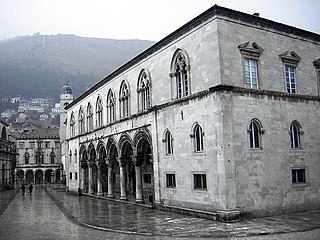
Dubrovnik, historically known as Ragusa, is a city in southern Dalmatia, Croatia, by the Adriatic Sea. It is one of the most prominent tourist destinations in the Mediterranean, a seaport and the centre of the Dubrovnik-Neretva County. Its total population is 41,562. In 1979, the city of Dubrovnik was added to the UNESCO list of World Heritage Sites in recognition of its outstanding medieval architecture and fortified old town.

Dživo Franov Gundulić, better known today as Ivan Gundulić, was the most prominent Baroque poet from the Republic of Ragusa. He is regarded as the Croatian national poet. His work embodies central characteristics of Roman Catholic Counter-Reformation: religious fervor, insistence on "vanity of this world" and zeal in opposition to "infidels". Gundulić's major works—the epic poem Osman, the pastoral play Dubravka, and the religious poem Tears of the Prodigal Son are examples of Baroque stylistic richness and, frequently, rhetorical excess.

Matija Antun Relković was Habsburg military officer and a Croatian writer.
Andrić is a Croatian and Serbian surname, derived from Andrija. It may refer to:

The unveiling of the Gundulić monument in Dubrovnik on May 20, 1893, was a symbolical event in the political history of Dubrovnik, since it brought to the surface the wider tensions between the two political sides of the city, the Croats and the Serb-Catholics in the pre-World War I political struggles in the region.
The Vladimir Nazor Award is a Croatian prize for arts and culture established in 1959 and awarded every year by the Ministry of Culture.

Vlaho Getaldić was a Dalmatian writer, translator and politician from Dubrovnik.

Ivan Stojanović was a Catholic priest from Dubrovnik who wrote the book Dubrovačka Književnost, published in 1900, arguing that the people of Dubrovnik were Roman Catholic by religion, but by language Serbs. He was involved with the literary journal Slovinac.
The Greatest Croatian was an open-access poll conducted over five weeks in 2003 by the Croatian weekly Nacional.
Franjo is a Croatian masculine given name.

The rector was an official in the government of the Republic of Ragusa. The holder was the head of the executive powers of Ragusa, part of the Small Council. The rector was seated at the Rector's Palace.
Karlo is an Albanian, Basque, Croatian and Esperanto masculine given name as well as a Slovene masculine given name that serves as a Slovene diminutive form of Karel.
Frano is a Croatian masculine given name.






